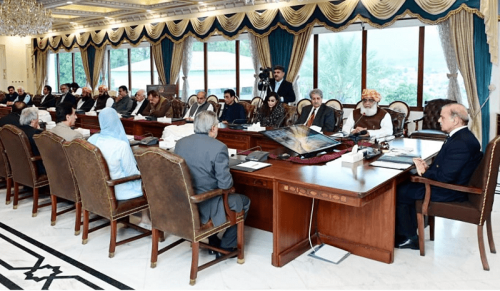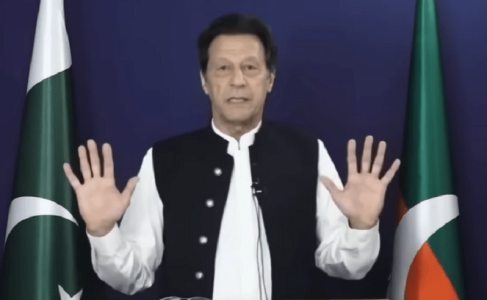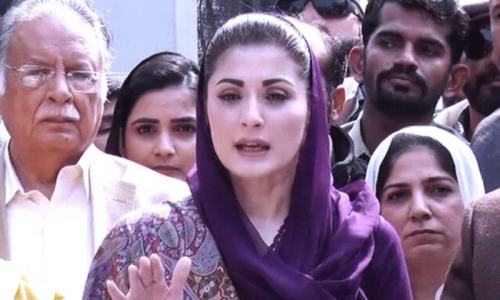ISLAMABAD: Hitting out hard at the judiciary, a key government minister on Wednesday termed the “imperial Supreme Court (SC) a menace to democracy” and a “usurper” of the rights of all state institutions, as lawmakers in the National Assembly continued their one-sided assault on judges and the Pakistan Tehreek-i-Insaf (PTI) in the wake of the controversial verdict of a three-judge SC bench to hold elections in Punjab on May 14.
“The law is a sword, shield and a menace. And it’s to my deepest regret to state before this house that the imperial SC is a menace to democracy [in this country],” said Federal Minister for Power Khurram Dastgir Khan while using the famous quote of US philosopher and jurist Ronald Dworkin in his speech, as Speaker Raja Pervaiz Ashraf allowed lawmakers to have a full-fledged debate on the April 4 court’s verdict on points of order, which consumed more than four hours.
Besides Mr Khan, almost all the speakers, including other federal ministers, in their speeches accused the judiciary of facilitating PTI Chairman Imran Khan and said the SC verdict would divide the nation and the country.
In their speeches, the members took names of former chief justices, including Iftikhar Chaudhry and Saqib Nisar, accusing them of usurping the rights of all the institutions through the alleged misuse of suo motu powers given in the Constitution and questioned the reluctance of Chief Justice of Pakistan Umar Ata Bandial in constituting a full court bench.
NA continues bashing judiciary, PTI in one-sided proceedings; speaker allows debate during points of order
Mr Khan alleged that “by consistently showing a tilt towards one person, the court has turned into another political institution and thus undermining its own legitimacy”. He said after facing dictatorship and terrorism, they were now confronting an “imperial Supreme Court”.
Criticising the judiciary for legitimising past military rules, the minister said there had been a “nexus between the generals and the judges” which had imposed “the doctrine of necessity” on the nation.
He said they either had to struggle against the generals and when there was no military rule, they had to face the judges. The country, he said, needed “doctrine of democracy and not doctrine of necessity”.
“The imperial SC has usurped the rights of legislation, executive, constitutional institutions, lower courts and even their fellow judges,” said the minister while accusing the CJP of encroaching the domain of the Election Commission of Pakistan (ECP) by announcing the election date.
He said Clause 69 of the Elections Act, 2017, called for holding of elections in the country on a single day besides empowered the ECP to delay the elections, if a situation arose beyond its control.
Health Minister Qadir Patel in his hard-hitting speech suggested that the candidates should be asked to submit their nomination papers in the SC, instead of the ECP.
Opposition Leader and a PTI dissident Raja Riaz as usual in his unimpressive speech mostly targeted Imran Khan and used some derogatory remarks against him which were expunged by the speaker.
Lashing out at the judiciary, Mr Riaz regretted that instead of listening to the voices of the parliament and lawyers’ organisation, the court preferred to side with a “drug addict”. The opposition leader used street language and cursed the judges.
The opposition leader was directed by the speaker to select appropriate and parliamentary words in the speech. Later, he received flak from his own colleague and another PTI dissident Riaz Mazari, who advised the opposition leader not to talk like those sitting in hotels.
Religious Affairs Minister Mufti Abdul Shakoor also hit out at the SC and suggested that the SC should now be called a “PTI’s wing.”
“Is he the CJP or the PTI’s vice-chairman?” asked the minister while making another suggestion that it would be appropriate to place the ECP under the SC.
“When they [judges] are giving schedule and dates [for polls] then what is the need for having the ECP. Better merge the ECP with SC and make the CJP its head,” he said mockingly. And then he suggested giving powers of the president, the prime minister, the speaker and the Senate chairman also to the CJP as there was no need for other institutions when the SC was not caring even for the resolution that had been passed by the parliament seeking formation of a full court.
Federal Minister for Information Technology Aminul Haque of the Muttahida Qaumi Movement (MQM) alleged that efforts were being made to create a constitutional crisis in the country which was already facing political and economic mess.
Mr Haque expressed his surprise that the SC’s verdict talked only about the polls in Punjab whereas it seemed that the court had no concern over the elections within 90 days in Khyber Pakhtunkhwa province. He said it was evident that the ladla (blue-eyed) was being facilitated.
He said the upcoming general elections in the country would be held after the completion of the digital census and delimitation of constituencies.
Lone member of the Jamaat-i-Islami (JI) sitting on the opposition benches despite being a part of the ruling Muttehida Majlis-i-Amal (MMA) Maulana Abdul Akbar Chitrali on this occasion supported the stance taken by the ruling coalition and called for the constitution of a full court on the matter, stating that Islam also called for decisions through consultations.
He also stated that his party believed that elections of the National Assembly and all the provincial assemblies should be held simultaneously.
Naz Baloch of the PPP said that “the worst form of injustice is pretended justice”.
Another federal minister Hashim Notezai took the SC to task over alleged misuse of suo motu powers and questioned as to why the court didn’t take any notice of over 5,000 missing persons in Balochistan province.
Published in Dawn, April 6th, 2023

















































Dear visitor, the comments section is undergoing an overhaul and will return soon.